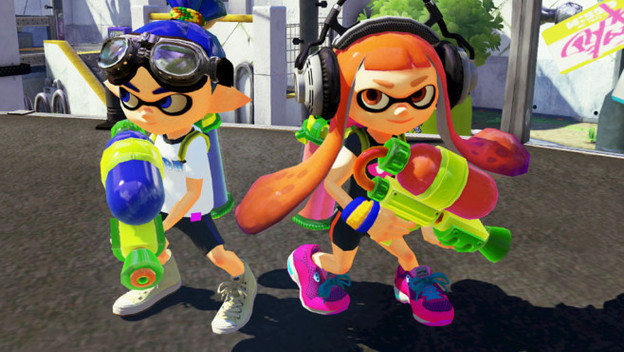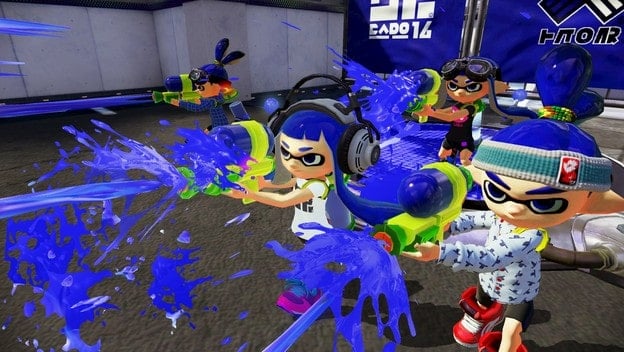Splatoon, Nintendo’s first real foray into the first person shooter genre, is looking to be a pretty awesome game. Though cutsey and cartoony in nature, its mechanics are solid. The basic premise is that your guns all fire ink, and wherever there is ink on the ground, you move faster and your opponents move slower. Not only that, but your own ink gives you a lot of traversal and stealth options, letting you climb to outcroppings you normally couldn’t and hide deep in the ink to avoid being detected. But even though your characters, the Inklings, are firing ink at each other, you still have the same variety of weapons you would see in any other FPS. You’ll use ink shotguns, ink sniper rifles, and even ink melee weapons. Add to this a variety of new game modes based around ink, like area control modes which require you to paint more of the landscape than your opponent, and you have a formula for an innovative FPS experience.
But there is a problem with Splatoon that doesn’t look like it will be fixed any time soon: Nintendo refuses to let players chat online with each other. They cited player toxicity as the reason, fearing that young children will be exposed to negativity and general bigotry. Of course, this is Nintendo we are talking about, and they wouldn’t do anything that would make their game less appealing to younger players, so this is entirely understandable.
At the same time, the game is essentially a team-based shooter. Heck, it doesn’t even boast a free-for-all mode. Team-based shooters require teamwork, which is really impossible to coordinate without voice chat or a similar quick communication option. Otherwise, you just sort of have to guess at what your teammates are doing, which leads to a lot of people running around randomly and ineffectually.
Past evidence shows that Nintendo doesn’t particularly care if players run around randomly and ineffectually. Just look at Smash 4 (Zing!). But in all seriousness, even though Nintendo figures that the game would be fun on its own without player communication, their policies are holding it back. Many people who have reviewed the game have already said that they would go to great lengths to get teams together on VOIP clients just so they could have the upper hand against their opponents, and the fact that they have to use Skype to do this instead of an in-game voice protocol is shameful in this day and age.
Nintendo could have handled this in a lot of different and more effective ways. For example, they could have included parental controls into the game, requiring a password to unlock voice chat or something. They could have cut off voice chat until you hit higher ranks of the game, or leave it just to “professional” matches. Voice chat could have been locked to your age in a profile, and you have to log into a profile to play the game.
Of course, all of these methods can be circumvented by any kid with a little bit of ingenuity, which is something Nintendo would never risk.

So if we think of this another way, maybe it’s not Nintendo’s unwillingness to compromise that is the real problem. Maybe it’s our unwillingness to treat online play spaces with respect. We have long accepted the toxic online environment as, “just how things are” in the gaming world, but does it have to be? This is, essentially, an example of an incredibly fun game that will be held back because we don’t know how to not tell people to kill themselves if we lose a game or two. It’s possible that the real problem is us. Heck, if the online world wasn’t toxic, then Nintendo would have no reason to restrict voice chat.
It makes you wonder about what other games could be coming out, but aren’t because of the way we behave. We may never know, because we will never see them. If anything, that will make me watch my Ps and Qs on voice chat more often.
I’ll still curse like a sailor in real life, though.
